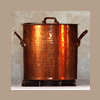-
Welcome to the eG Forums, a service of the eGullet Society for Culinary Arts & Letters. The Society is a 501(c)3 not-for-profit organization dedicated to the advancement of the culinary arts. These advertising-free forums are provided free of charge through donations from Society members. Anyone may read the forums, but to post you must create a free account.
Michael Pollan on TV Food shows and Home Cooking
-
Similar Content
-
- 0 replies
- 3,058 views
-
- 7 replies
- 6,107 views
-
- 26 replies
- 21,795 views
-
Selling Chocolates at Shows and Farmers' Markets 1 2 3 4
By carol lang,
- Chocolate
- Confections
- (and 1 more)
- 86 replies
- 53,408 views
-
- 397 replies
- 86,752 views
-
-
Recently Browsing 0 members
- No registered users viewing this page.




Recommended Posts